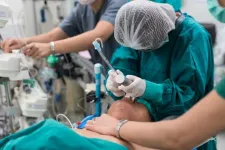(Press-News.org) DALLAS - March 23, 2021 - It's not just your legs and heart that get a workout when you walk briskly; exercise affects your brain as well. A new study by researchers at UT Southwestern shows that when older adults with mild memory loss followed an exercise program for a year, the blood flow to their brains increased. The results were published online today in the Journal of Alzheimer's Disease.
"This is part of a growing body of evidence linking exercise with brain health," says study leader Rong Zhang, Ph.D., professor of neurology at UTSW. "We've shown for the first time in a randomized trial in these older adults that exercise gets more blood flowing to your brain."
As many as one-fifth of people age 65 and older have some level of mild cognitive impairment (MCI) - slight changes to the brain that affect memory, decision-making, or reasoning skills. In many cases, MCI progresses to dementia, including Alzheimer's disease.
Scientists have previously shown that lower-than-usual levels of blood flow to the brain, and stiffer blood vessels leading to the brain, are associated with MCI and dementia. Studies have also suggested that regular aerobic exercise may help improve cognition and memory in healthy older adults. However, scientists have not established whether there is a direct link between exercise, stiffer blood vessels, and brain blood flow.
"There is still a lot we don't know about the effects of exercise on cognitive decline later in life," says C. Munro Cullum, Ph.D., professor of psychiatry at UTSW and co-senior author of the study. "MCI and dementia are likely to be influenced by a complex interplay of many factors, and we think that, at least for some people, exercise is one of those factors."
In the study, Zhang, Cullum, and their colleagues followed 70 men and women aged 55 to 80 who had been diagnosed with MCI. Participants underwent cognitive exams, fitness tests, and brain magnetic resonance imaging (MRI) scans. Then they were randomly assigned to either follow a moderate aerobic exercise program or a stretching program for one year. The exercise program involved three to five exercise sessions a week, each with 30-40 minutes of moderate exercise such as a brisk walk.
In both programs, exercise physiologists supervised participants for the first four to six weeks, then had the patients record their exercises and wear a heart rate monitor during exercise.
Forty-eight study participants - 29 in the stretching group and 19 in the aerobic exercise group - completed the full year of training and returned for follow-up tests. Among them, those who performed aerobic exercise showed decreased stiffness of blood vessels in their neck and increased overall blood flow to the brain. The more their oxygen consumption (one marker of aerobic fitness) increased, the greater the changes to the blood vessel stiffness and brain blood flow. Changes in these measurements were not found among people who followed the stretching program.
While the study didn't find any significant changes in memory or other cognitive function, the researchers say that may be because of the small size or short length of the trial. Changes to blood flow could precede changes to cognition, they say. They're already carrying out a larger two-year study, Risk Reduction for Alzheimer's Disease (rrAD), that further investigates the link between exercise and cognitive decline.
"There are likely some people who benefit more from exercise than others," says Cullum. "But with the sample size in this study, it was hard to analyze subgroups of people to make those conclusions."
Still, the data are important to help explain the effects of exercise on the brain and why it can be beneficial, say Zhang and Cullum, who are members of the Peter O'Donnell Jr. Brain Institute.
"Having physiological findings like this can also be useful for physicians when they talk to their patients about the benefits of exercise," says Zhang. "We now know, based on a randomized, controlled trial, that exercise can increase blood flow to the brain, which is a good thing."
INFORMATION:
Cullum holds the Pam Blumenthal Distinguished Professorship in Clinical Psychology at UT Southwestern.
Other UTSW researchers who contributed to this study were Tsubasa Tomoto, Danilo Cardim, Takashi Tarumi and Linda Hynan. Collaborators were Jie Liu of Rutgers University; Benjamin Tseng of the University of Texas at Tyler; and Evan Pasha of Texas Health Presbyterian Hospital Dallas.
This research was supported with funds from the National Institutes of Health (R01AG033106 and R01HL102457).
About UT Southwestern Medical Center
UT Southwestern, one of the premier academic medical centers in the nation, integrates pioneering biomedical research with exceptional clinical care and education. The institution's faculty has received six Nobel Prizes, and includes 23 members of the National Academy of Sciences, 17 members of the National Academy of Medicine, and 13 Howard Hughes Medical Institute Investigators. The full-time faculty of more than 2,500 is responsible for groundbreaking medical advances and is committed to translating science-driven research quickly to new clinical treatments. UT Southwestern physicians provide care in about 80 specialties to more than 105,000 hospitalized patients, nearly 370,000 emergency room cases, and oversee approximately 3 million outpatient visits a year.
A study of ancient bones shows that Early Neolithic sheep-breeders were faced with high levels of mortality among young animals in their herds. A statistical model, partly developed at Ludwig-Maximilians-Universitaet (LMU) in Munich, allowed the age distribution of the bones to be precisely determined.
In the 8th millennium BCE, early sheep-herders were already aware that the conditions under which their animals were housed had an impact on mortality rates among the lambs. This one result of a study researchers led by Nadja Pöllath (a curator at the State Collection for Anthropology and Palaeoanatomy in Munich), LMU zooarchaeologist Joris Peters (who is also the Director of the state collection) ...
The BioRescue consortium develops and applies new technological approaches as a last straw for saving critically endangered species such as the northern white rhinoceros. Advanced Assisted Reproductive Technologies (aART) push the boundaries of what can be done to create new offspring. Consequently, new ethical questions regarding the application of these tools arise and need to be answered, and relevant animal welfare issues to be addressed. In order to ensure that the ethical risk assessment matches the technological breakthrough with aART, the BioRescue ...
Despite guidelines promoting outpatient management of patients with low-risk pulmonary embolism (PE), few patients are currently discharged home from hospital emergency departments in the United States. That is the conclusion of a study titled Outpatient Management of Patients Following Diagnosis of Acute Pulmonary Embolism, published in the March 2021 issue of Academic Emergency Medicine (AEM), a journal of the Society for Academic Emergency Medicine (SAEM).
The retrospective cohort study of more than 61,000 patients treated at 740 acute care United States emergency departments during a two-year period sought to determine disposition practices and subsequent health care utilization in patients with acute PE. According to the findings, ...
A study co-authored by researchers at the Johns Hopkins Bloomberg School of Public Health found that telehealth consults among privately insured working-age patients accounted for almost 24 percent of outpatient consults with health care providers during the early phase of the pandemic, March to June 2020, up from less than 0.3 percent during the same period in 2019.
The dramatic shift occurred as many medical practices halted or curtailed in-person office hours and patients stayed away from doctor's offices out of fear of transmission during the early months of the pandemic. At the same time, insurance companies and the federal government relaxed policies around telehealth to meet demand for remote medical consults ...
Most people relate cholesterol to heart health, but it is also a critical component in the growth and spread of brain cancer. VCU Massey Cancer Center researcher Suyun Huang, Ph.D., recently discovered how cholesterol becomes dysregulated in brain cancer cells and showed that the gene responsible for it could be a target for future drugs.
The mean survival of patients with the most common and aggressive type of brain cancer, glioblastoma multiforme (GBM), is 14 months. The need to find new, effective treatments is urgent and has driven Huang, a member of the Cancer Biology research program at Massey, to detail ...
Some 40% of critically ill patients who undergo tracheal intubation to support their breathing suffer a life-threatening complication, research from National University of Ireland Galway has revealed.
The study, published today in JAMA: The Journal of the American Medical Association, involved 2,964 critically ill men and women. It was carried out across 29 countries from 1 October 2018 to 31 July 2019 to determine the risk of adverse events arising from the invasive procedure.
John Laffey, Professor of Intensive Care Medicine at NUI Galway and Consultant in ...
HOUSTON - (March 23, 2021) - Fish that dine on corals may pay it forward with poop.
It's an unexpected twist on coral reef symbiosis, said Rice University marine biologist Adrienne Correa, whose lab discovered coral predator feces are jam-packed with living symbiotic algae that corals depend on for survival. The discovery confirms that poop from coral-eating fish is an important environmental source of symbiotic dinoflagellate algae on coral reefs.
Correa said coral-eating predators are typically thought of as biting and weakening reef structures, thereby generating hiding spaces for other organisms and, ultimately, beach sand. In contrast, grazing fish that crop down bushy algae get the limelight for helping reefs maintain healthy coral ...
Hummingbird hawkmoths are small insects that hover in the air like hummingbirds when drinking nectar from flowers. Dr. Anna Stöckl from the Biocentre of the Julius-Maximilians-Universität (JMU) Würzburg in Bavaria, Germany, is studying the visual performance of these insects. Dr. Stöckl and her doctoral student Ronja Bigge now present their latest findings in the journal Current Biology.
"To control their flight, hummingbird hawkmoths rely on optic flow in the lower half of their visual field," Ronja Bigge explains. Optic flow is the relative motion that the surrounding image casts on the animals' retinas when they fly. We experience this phenomenon ourselves when travelling by train ...
DETROIT (March, 23, 2021) - Henry Ford physician, John Craig, M.D., is leading an international research effort to improve the multidisciplinary collaboration between otolaryngologists and dental providers around the globe when it comes to diagnosing odontogenic sinusitis (ODS).
ODS is an infectious condition of the paranasal sinuses that can occur from either dental infection or dental procedures involving the upper jaw. There are multiple ways that infection can spread from the teeth to sinuses, and in more severe scenarios, to the eye, brain, or rest of the body. It has been shown that the various clinicians ...
Rural America is running short on physicians. This worries health experts who have linked limited access to primary care providers to major gaps in health outcomes for rural communities.
Addressing this issue is complicated, but new research from the University of Georgia suggests that understanding geographic trends in medical school applicants could help project where the future physician workforce is likely to practice.
Knowing a medical student's hometown is an important piece of the puzzle, said study author Donglan "Stacy" Zhang, because geography is known to predict where many new doctors choose to practice.
"More than 60% of doctors choose their practice location in ...





